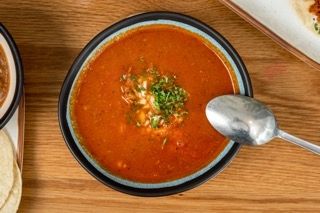Is Mexican Food Healthy? Unboxing the Nutritional Advantages of Typical Ingredients
The concern of whether Mexican food is healthy and balanced welcomes an exploration of its conventional active ingredients. Beans and corn function as foundational staples, rich in healthy protein and fiber. Avocados give useful fats, while numerous natural herbs and spices add taste and wellness benefits - New York Times rated. Together, these elements develop a tapestry of nourishment. However, the healthiness of Mexican cuisine commonly relies on prep work approaches and portion sizes. What function do these aspects play in establishing its total nutritional worth?
The Power of Beans: Healthy Protein and Fiber-Rich Staples
Although usually overlooked, beans offer as a cornerstone of Mexican food, supplying a wide range of nutritional benefits. Rich in healthy protein, they are an exceptional plant-based option for those seeking to meet their dietary healthy protein requires. This high healthy protein material supports muscular tissue fixing and development, making beans vital for both vegetarians and meat-eaters alike. Additionally, beans are an extraordinary source of nutritional fiber, which helps in digestion and advertises a sensation of fullness, potentially assisting with weight administration.
The range of beans used in Mexican recipes, such as black beans, pinto beans, and kidney beans, adds to a diverse flavor profile and can enhance dishes nutritionally. Additionally, beans are low in fat and contain important vitamins and minerals, consisting of iron, magnesium, and folate. Together, these features make beans an important ingredient, providing both nourishment and food in conventional Mexican price.

Corn: a Versatile Grain With Nutritional Conveniences
Corn stands apart as a flexible grain basic to Mexican food, commemorated not just for its culinary applications but also for its outstanding nutritional account. As a main active ingredient in recipes like tortillas, tamales, and pozole, corn provides important nutrients that contribute to a well balanced diet. Rich in carbohydrates, it works as a significant energy source, while also being low in fat, making it a beneficial option for different dietary requirements.
Corn is an excellent resource of dietary fiber, which helps in digestion and promotes satiation. It has substantial quantities of vitamins such as B-complex vitamins, which are necessary for power metabolism. The existence of antioxidants, specifically carotenoids, contributes to overall wellness by lowering oxidative stress and anxiety. In addition, corn is gluten-free, accommodating those with gluten sensitivities. Overall, the nutritional benefits of corn underscore its relevance in standard Mexican food and its function in a healthy diet regimen.
Avocados: Healthy And Balanced Fats and Nutrients in Every Bite
Avocados play a considerable duty in Mexican food, matching dishes with their luscious structure and rich taste. Past their cooking allure, avocados are celebrated for their impressive dietary profile. They are an abundant resource of healthy monounsaturated fats, which can aid reduced poor cholesterol degrees and support heart health. In addition, avocados are packed with essential nutrients, including potassium, vitamin E, and B vitamins, contributing to overall health.
The high fiber content in avocados help digestion and advertises satiation, making them a beneficial enhancement to any kind of meal. Their unique nutrient make-up can additionally sustain skin health and wellness and provide anti-inflammatory advantages. Incorporating avocados right into standard Mexican dishes or appreciating them as a standalone snack can improve both taste and nutrition, showing why they are a cherished staple in Mexican cuisine. Overall, avocados offer a tasty means to delight in healthy and balanced fats and essential nutrients in every bite.

Natural Herbs and seasonings: Flavorful Wellness Boosters
While enjoying the rich tastes of Mexican food, one can not forget the essential role that spices and herbs play in enhancing both taste and health. Components such as cilantro, oregano, and chili peppers not just add to the lively taste account however likewise offer considerable health and wellness benefits. For example, cilantro is known for its cleansing residential properties, assisting to get rid mexican food of heavy metals from the body, while oregano is loaded with anti-oxidants and possesses anti-inflammatory effects.
Chili peppers, a staple in many Mexican recipes, include capsaicin, which has been linked to boosted metabolic rate and pain relief. Furthermore, flavors like cumin and coriander support digestion and may assist in blood sugar level guideline. Including these savory wellness boosters into meals not only enhances the cooking experience however also advertises general well-being, making Mexican food not just scrumptious, but likewise nutritionally beneficial.
Typical Food Preparation Methods: Enhancing Nutrition and Flavor
Conventional food preparation approaches in Mexican food play an important function in enhancing both nourishment and flavor, as they commonly prioritize fresh ingredients and time-honored techniques. Methods such as nixtamalization, where corn is soaked and cooked in an alkaline remedy, not only boost the nutrient profile of tortillas yet additionally boost their digestibility - lunch and dinner. Furthermore, making use of slow cooking techniques, like cooking or braising, allows tastes to blend magnificently while preserving the integrity of the components

Frequently Asked Inquiries
Are Mexican Food Portions Normally Larger Than Other Foods?
Mexican food parts are often bigger than those of many other foods. This characteristic mirrors conventional eating practices, stressing communal sharing and hearty meals, which can bring about a more considerable serving size on the whole.
How Does the Preparation Approach Affect Healthiness of Mexican Food?
Prep work approaches significantly affect the healthfulness of Mexican food. Techniques such as barbecuing or steaming maintain nutrients, while frying can increase undesirable fat material. Options of ingredients and cooking styles eventually establish overall nutritional worth.
Can Mexican Food Be Customized for Details Dietary Limitations?
Mexican food can without a doubt be tailored for particular dietary limitations. Replacements, such as using corn tortillas for gluten-free diets or integrating even more vegetables, allow people to take pleasure in traditional flavors while accommodating various nutritional requirements.
What Prevail Misconceptions About Mexican Food and Health?
Common misconceptions about Mexican food include the idea that it is naturally undesirable, excessively hot, and entirely concentrated on fats. In fact, typical meals commonly feature nutritious ingredients and can be customized to numerous dietary needs.
Are There Healthier Alternatives at Mexican Dining Establishments?
Much healthier alternatives at Mexican dining establishments typically include grilled meats, beans, and fresh veggies. Picking meals that highlight whole ingredients and staying clear of hefty sauces can cause a much more nutritious eating experience, advertising general well-being.
The selection of beans utilized in Mexican meals, such as black beans, pinto beans, and kidney beans, contributes to a varied flavor profile and can boost dishes nutritionally. Avocados play a significant duty in Mexican food, complementing meals with their velvety texture and abundant flavor. Incorporating avocados right into standard Mexican dishes or appreciating them as a standalone snack can enhance both taste and nourishment, demonstrating why they are a precious staple in Mexican food. While delighting in the abundant flavors of Mexican food, one can not ignore the important duty that spices and natural herbs play in enhancing both preference and health. Typical cooking approaches in Mexican cuisine play an essential function in boosting both nutrition and taste, as they typically focus on classic techniques and fresh active ingredients.